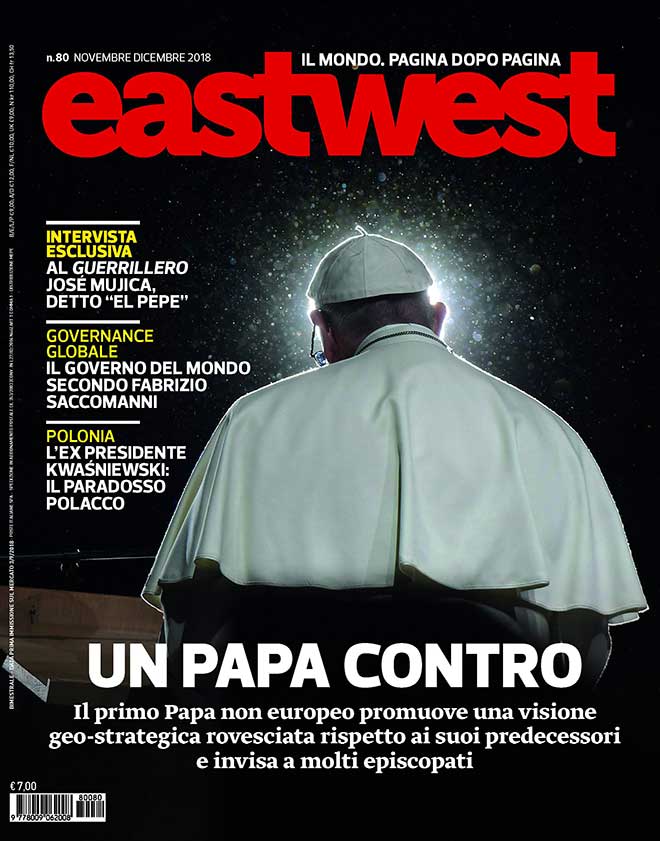
Jamal Khashoggi, a dissident Saudi journalist self-exiled in Turkey, entered his consulate in Istanbul to renew some documents when a death squad, presumably sent by Riyadh, complete with a forensic specialist and a member of the hereditary prince’s personal guard, tortured and massacred the journalist, cutting his body up into pieces so it could be disposed of and then leaving the consulate with arms and legs stashed in bags and suitcases. This gruesome murder, the brutality of which now awaits confirmation by the ongoing enquiry, took place last October 2nd and not in the 13th century, and forces us consider a few things:
– The reformist actions of Mohammed bin Salman don’t seem to be achieving the modernisation and de-tribalisation of a backward and violent society. Even more unacceptable is the unconditional support that is traditionally bestowed on the Riyadh regime by the United States, to which this administration has signed up to in no uncertain terms.
– Blackrock, JPMorgan and Blackstone immediately withdrew their participation in the major conference held annually in Saudi Arabia, nicknamed “Davos in the Desert” , and an obvious vehicle of the overeager global ambition of the Saudi leadership. The reaction of the three international finance giants proves once again that the markets are much wiser and opportune than a political establishment that is increasingly incapable of dealing with international crises and can hardly stand as a bastion of ideals and values shared by international public opinion. These are facts that cannot be refuted by the populist rhetoric that aims to disenfranchise international finance to empower the people, and we must thus seriously consider how we can reboot our belaboured democracies.
– Freedom of the press is under attack from all quarters, not just in China and Turkey. In the Gulf’s dictatorships the media have never had it easy, but this level of brutality, on display in a foreign country, is truly unacceptable. And these days even Europe is in a difficult situation owing to populist calls to action that undermine all institutional brokerage in the name of a supposed will of the people. How can one hope to reverse this aggressive trend? In two ways: by fighting a daily battle and facing up to one’s own shortcomings. The second point, which is probably the trickiest to resolve, should convince us to change our attitude towards power and reaffirm our role as intermediaries, which can only boost our authority and responsibility in a modern democracy. Only by setting ourselves apart from the unfiltered news that is flooding the web can we hope to enhance our credibility and thus re-establish the value and role of the printed word.
– Finally, one consideration that may seem minor yet highlights the lack of the kind of intellectual honesty that should be promoted by independent media. The anti-Turkish prejudice that we have often pointed out in our magazine can be found once again in how the Western press has reported this fearful homicide in the last few days. By mentioning just the city where the event took place in titles, the superficial reader (80%) has got the impression that the murderers were Turks and not Saudis, as was obvious from the outset.
A superpower, by definition, has to take on economic and political responsibility but must also provide moral leadership. Washington shouldn’t try to sweep these kinds of events under the carpet, yet previous instances, and we are here referring to the Bush family’s dangerous friendships in the middle of the 9/11 fracas, give us little hope this will be the case.
To subscribe to the magazine please access our subscription page here
Jamal Khashoggi, a dissident Saudi journalist self-exiled in Turkey, entered his consulate in Istanbul to renew some documents when a death squad, presumably sent by Riyadh, complete with a forensic specialist and a member of the hereditary prince’s personal guard, tortured and massacred the journalist, cutting his body up into pieces so it could be disposed of and then leaving the consulate with arms and legs stashed in bags and suitcases. This gruesome murder, the brutality of which now awaits confirmation by the ongoing enquiry, took place last October 2nd and not in the 13th century, and forces us consider a few things:
– The reformist actions of Mohammed bin Salman don’t seem to be achieving the modernisation and de-tribalisation of a backward and violent society. Even more unacceptable is the unconditional support that is traditionally bestowed on the Riyadh regime by the United States, to which this administration has signed up to in no uncertain terms.





